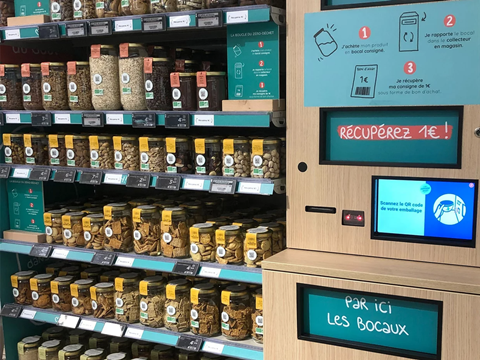
A ‘zero-waste’ shopping solution has been introduced by Botanic in partnership with Bocoloco, replacing single-use plastics with reusable and returnable jars for buying food products in bulk.
According to OECD, 460 million tonnes of plastic were produced worldwide in 2019. This is thought to have resulted in 353 million tonnes of waste – only 10% of which was recycled.
Similarly, ADEME calculates that the equivalent of a garbage truck of plastic waste makes its way into the world’s oceans every minute.
It is believed that a million tons of plastic packaging enter the French market annually, with Botanic and Bocoloco warning that optimized recycling processes cannot singlehandedly overcome the plastic waste crisis. They uplift the elimination of primary packaging, buying in bulk, and reusing containers as complementary measures to cut down on single-use plastics without generating food waste or compromising health and safety.
Around thirty organic products from French brands have been selected by Botanic, fitting into such food categories as breakfast, confectionary, starchy foods, and legumes. These products are put into reusable jars at Bocoloco’s warehouse in the 18th arrondissement of Paris; the containers are thought to eliminate 25 grams of waste on average per product and protect the safety, hygiene, and organoleptic qualities of the foods in question.
The jars are subsequently distributed to Botanic stores. Consumers can then purchase the products with an additional €1 deposit per product.
Once the jar is empty, it can be returned to collection bins in-store; the consumer receives a €1 voucher valid across Botanic stores, while Bocoloco collects, washes, and reuses the packaging at its facilities in a ‘short-circuit management’ process.
On-pack QR codes are also set to offer traceability, providing access to such information as the product’s origin, ingredients, recipes, and more.
The system is designed for simplicity, aiming to ensure that responsible and waste-free consumption ‘no longer seems like an obstacle course’ for the modern consumer. An online, ‘zero-waste’ grocery store is hoped to assist in this transition.
Botanic and Bocoloco emphasize that individual consumers can each play a part in the zero-waste transition. They intend to balance the ‘urgency’ of cutting down on plastic packaging with a desire to encourage consumers, rather than making them feel guilty about their purchases.
Late last year, members of the UK Refill Coalition – GoUnpackaged, Aldi UK, Ocado Retail, and CHEP – came together to pilot an in-store refill system for dry goods at Aldi’s store in Solihull, England. Refillable and reusable packaging was provided for food, personal care, and household products; this could then be reused in store – or, in the case of pre-filled vessels bought online, returned to an Ocado driver after use.
M&S and Reposit came together to expand their own Refilled scheme for own-brand cleaning and laundry products this year. Consumers pay an initial £2 deposit for a returnable bottle, then receive a £2 voucher for returning it – this can be redeemed against a second purchase in the M&S Refilled range.
Additionally, we spoke to Jodie Roussell and Antje Shaw – global public affairs lead and global packaging sustainability manager, respectively, at Nestlé – about the company’s findings regarding reuse and refill. They highlighted consumer expectations of convenience at low cost, noted the challenges of running such schemes in hot and humid climates, and underlined the importance of collaboration in a successful reuse and refill scheme.
If you liked this story, you might also enjoy:
How are the top brands progressing on packaging sustainability?
The ultimate guide to global plastic sustainability regulation














No comments yet